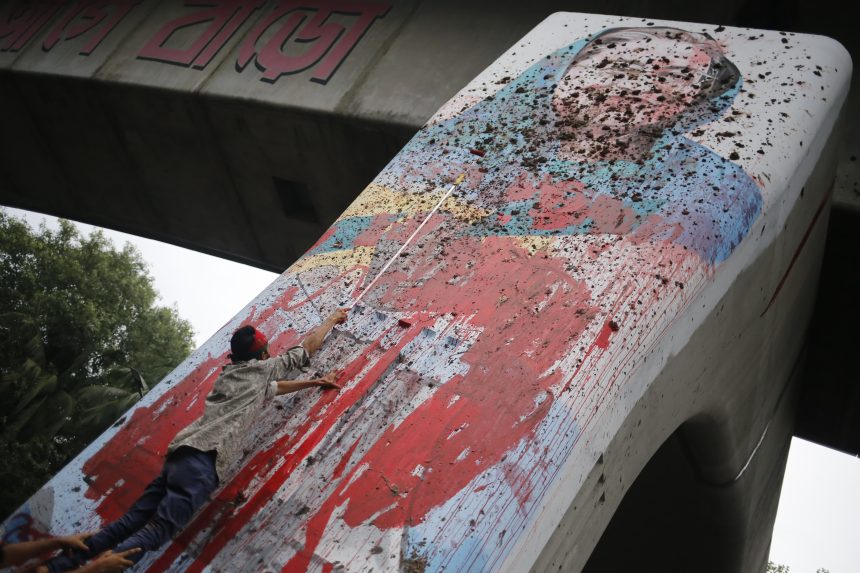Leaders of the anti-discrimination student movement reaffirmed their commitment to continue their protests, despite a nationwide crackdown resulting in thousands of arrests. Marking a pivotal day in the protest calendar, the coordinators announced a new phase of their movement with expanded demands beyond the original quota reform issue.
Key coordinator Asif Mahmud Shojib Bhuyain on July 25, 2025 shared the statement on Facebook quoting fellow coordinator Nahid Islam, who emphasized that the movement had evolved from a singular demand into a broader struggle for justice and systemic reforms.
“The movement will not end with the publication of the gazette notification on quota reform,” the statement read. “It will continue with a series of demands.”
The student leaders outlined several core demands: Justice for those killed and abducted during the protests, Compensation for victims and their families, Withdrawal of politically motivated cases, Release of innocent detainees, including former DUCSU Social Welfare Secretary Akhtar Hossain, Prosecution of those involved in campus violence, An end to politically backed terrorism on university campuses, Accountability for university administrations, An eight-point directive was also issued for protesting students, urging them to: Document the names of those killed and injured, Identify individuals responsible for the violence, Demand the reopening of educational institutions and dormitories, Provide aid to the injured, Visit the graves of deceased protesters, including Abu Sayeed from Rangpur, Offer prayers and condolences to affected families
These announcements followed the expiration of a 24-hour ultimatum issued on July 23 with four initial demands.
A separate faction of the movement, led by coordinator Hannan Masud, announced mourning processions and prayer gatherings after Jumuah prayers on July 26. Meanwhile, private university students declared a peaceful nationwide programme under the banner “Remove All Criminals from the State System.” They called for prayer services in all places of worship and peaceful demonstrations to draw the attention of constitutional bodies.
As the movement gained momentum, law enforcement intensified its “combing operation” to detain those allegedly involved in the unrest. According to Dainik Inqilab, at least 5,000 individuals were arrested between July 17 and 25. Dhaka accounted for 2,209 arrests, followed by Chattogram (735), Narsingdi (153), Sylhet (128), and Barishal (102). On July 25 alone, 451 people were arrested in 128 cases filed nationwide, with 201 cases filed in Dhaka alone.
Sarjis Alam, another key coordinator, denounced the arrests, labeling them as politically driven attempts to suppress the movement.
According to Dainik Samakal, three more protesters succumbed to their injuries, pushing the official death toll to 203 since July 16. Dhaka Medical College Hospital (DMCH) reported having conducted 85 autopsies and handed the bodies over to families. Eight unidentified bodies were buried by the charity organization Anjuman Mufidul Islam.
Amnesty International released a report on July 25 accusing Bangladeshi police of using lethal force against protesters. The United Nations also weighed in, with UN Secretary-General’s spokesperson Stéphane Dujarric urging a “transparent and credible investigation” into the violence.
Bangladesh Nationalist Party (BNP) Secretary General Mirza Fakhrul Islam Alamgir echoed this call, demanding an international inquiry into the deaths and mass arrests. Barrister AM Mahbub Uddin Khokon, President of the Supreme Court Bar Association and a BNP advisor, urged the government to lift the curfew and halt indiscriminate arrests of political activists and lawyers.
Despite signs of calm returning, curfew remained in effect for the sixth consecutive day on July 25, though relaxed between 8 AM and 5 PM to allow limited movement and business operations. Deposed Home Minister Asaduzzaman Khan Kamal announced that the curfew would continue in Dhaka, Narayanganj, Narsingdi, and Gazipur on July 26 and 27.
During curfew relaxation hours, long-distance bus counters and launch terminals saw increased passenger activity. The Bangladesh Inland Water Transport Authority (BIWTA) also resumed limited ferry operations.
Nonetheless, Dhaka remained heavily patrolled by the military and law enforcement agencies on high alert.
The Inter-Education Board postponed HSC and equivalent examinations scheduled for July 28, 29, 31, and August 1, citing safety concerns. Earlier exams scheduled for July 18, 21, 23, and 25 had already been deferred.
Earlier on July 25, ousted Prime Minister Sheikh Hasina visited the vandalized Mirpur-10 Metro Rail Station. Addressing the media, she urged citizens to unite against the “anarchists” responsible for the unrest that erupted on July 17.


